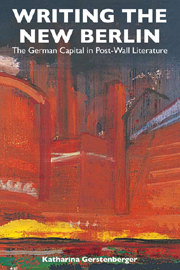Book contents
- Frontmatter
- Contents
- Acknowledgments
- Introduction: Newness and Its Discontents: Berlin Literature in the 1990s and Beyond
- 1 Erotic Sites: Sexual Topographies after the Wall
- 2 Bodies and Borders: The Monsters of Berlin
- 3 Multicultural Germans and Jews of Many Cultures: Imagining “Jewish Berlin”
- 4 Goodbye to East Berlin
- 5 Looking for Perspectives: The Construction at Potsdamer Platz
- Conclusion
- Bibliography
- Index
4 - Goodbye to East Berlin
Published online by Cambridge University Press: 05 February 2013
- Frontmatter
- Contents
- Acknowledgments
- Introduction: Newness and Its Discontents: Berlin Literature in the 1990s and Beyond
- 1 Erotic Sites: Sexual Topographies after the Wall
- 2 Bodies and Borders: The Monsters of Berlin
- 3 Multicultural Germans and Jews of Many Cultures: Imagining “Jewish Berlin”
- 4 Goodbye to East Berlin
- 5 Looking for Perspectives: The Construction at Potsdamer Platz
- Conclusion
- Bibliography
- Index
Summary
Über der Stadt liegt das Trauertuch. Die zuverlässigste Wertarbeit am Ende des Jahrtausends ist die Trauerarbeit geworden. Man maunzt der abgesägten Pappel am Karlplatz nach, entlädt Katzenjammer Über hingestreckte Straßennamen, beweint den Verlust maroder Ruinen …
[Over the city lies the shroud of mourning. The most dependable labor at the end of the millennium is the labor of mourning. People lament over the sawed-off poplar at Karlplatz, unload regret over discarded street names, bemoan the loss of ramshackle ruins …]
— Peter Wawerzinek, Café KomplottEast Berlin literature after 1989 is about a vanishing subject — a defunct political system and a disappearing way of life. The wall, after all, was a dramatic and palpable reminder of the divided Germany. East Berlin, where some of the most drastic changes in the urban structure took place, embodies the city's transformation into the New Berlin. While East Germans contribute the majority of texts, West Germans, immigrants, and writers from other backgrounds also add to a body of work whose timeline and geography are defined by life before and after the wall.
With few exceptions East Berlin texts of the 1990s and beyond view the GDR from a post-unification perspective. The end of the East German state, moreover, led to controversies over who should own its memory and how this memory will be constructed. These two aspects gave rise to a rich sub-genre of Berlin literature that includes documentary texts, diaries and interviews, fiction, and poetry.
- Type
- Chapter
- Information
- Writing the New BerlinThe German Capital in Post-Wall Literature, pp. 109 - 140Publisher: Boydell & BrewerPrint publication year: 2008

